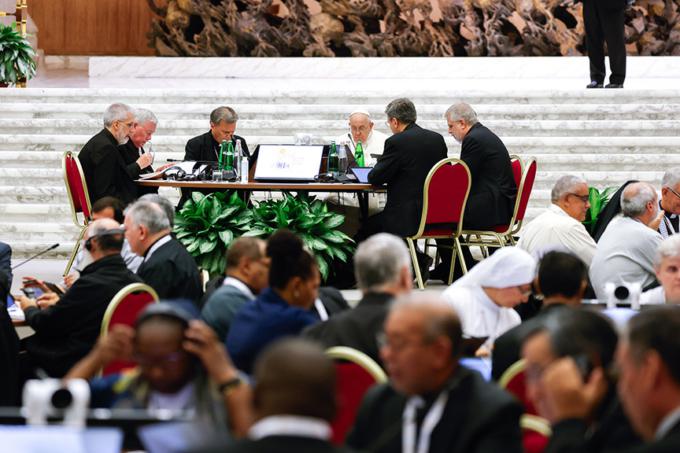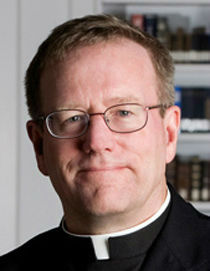
Spirituality
Being part of these groups shows that Jesus' command to go out to the ends of the world proclaiming the Gospel has been, against all odds and expectations, obeyed.

Barron
As some of you probably know, I've been in Rome for the past three weeks participating as a delegate at the Synod on Synodality. You might also have heard that in order to ensure the confidentiality of the proceedings, Pope Francis has asked all the members of the synod to refrain from disclosing what has been discussed. So, I won't be providing any juicy inside information. But I thought you might find it interesting to know what a typical day at the synod is like and what the overall atmosphere is.
I am residing, along with most of the other American delegates, at the North American College, situated on the Janiculum Hill, about a 15-minute walk from St. Peter's. We commence with a quiet Mass in a small chapel at 7 a.m., and then, after a quick breakfast, we make our way by bus to the Paul VI audience hall, where the synod is taking place. You have undoubtedly seen photos or videos of this venue, for it is where general audiences with the pope are held during the colder months of the year. They have cleared out the first 50 or so rows of chairs to open up a space for 36 round tables at which the delegates are seated. The leadership of the synod -- including the pope himself, when he is able to attend -- are situated at a round table on a slightly elevated platform at the front of the room.
The synodal day begins with prayer -- in either Italian, Spanish, English, or French -- and proceeds with a calling of the roll and an introduction to that day's work by Cardinal Grech, the General Secretary of the Synod. The focus of our attention is the so-called "Instrumentum Laboris" (working document), which represents a distillation of two years of preparatory conversations around the world. In our small groups, we consider the various sections of the "Instrumentum" under the guidance of a facilitator, who rather tightly manages the process. Each person around the table is expected to offer a prepared five-minute contribution, and then, in a second round of discussion, each can react to what the others have said. At the conclusion of this lengthy (and frankly, sometimes laborious) undertaking, the group puts together a three-minute summary of the main points of convergence and divergence. Then, one by one, each group shares these summaries with the plenary assembly. When those reports are finished, all of the delegates are permitted to request time for what are called "free interventions." Though the speeches are, in principle, limited to three minutes, speakers frequently go over the limit, and the days when we have to listen, in plenary assembly, to intervention after intervention are, I admit, rather tiresome.
The time that we spend in small groups is the most enjoyable, mostly because it enables us to get to know one another -- and we come from an astonishing variety of backgrounds. In the four groups in which I have so far participated, I have met bishops from Liberia, Hong Kong, the Philippines, Turkey, Germany, and Lithuania -- as well as lay delegates from Australia, Canada, Ireland, and Lebanon. I just don't think there is any other organization in the world that could gather a group of such stunning cultural and geographical diversity. Being part of these groups shows that Jesus' command to go out to the ends of the world proclaiming the Gospel has been, against all odds and expectations, obeyed.
I should say a word about the technology, which has worked rather impressively and represents a significant improvement over what was available at previous synods. There are, of course, simultaneous translations available through headsets, but there are also, at each table, cameras that can swivel into position to broadcast the speech of a given individual to the entire assembly. All of it has gone pretty much without a hitch, the great exception being when the system mistook me for my namesake, Sr. Mary Theresa Barron from Ireland!
The days are very long, commencing at 8:45 a.m. and ending at 7:15 p.m. -- and we work Monday through Saturday. Almost everyone that I've talked to is less than thrilled with the schedule and eager for a bit of a reprieve when we regather next year. A saving grace is the coffee breaks: the morning session featuring cappuccinos and the afternoon session a shot of espresso. During these informal times, we small talk, complain a bit, tell stories, and sometimes have some very serious conversations. During the breaks, I have engaged, to name just a few, Cardinal Christoph SchÖnborn of Vienna; Archbishop Anthony Fisher of Sydney; Cardinal Michael Czerny, head of the Vatican Dicastery on the Development of Peoples; Cardinal Oswald Gracias of Bombay (India); Cardinal Walter Kasper, a theologian whom I read with great interest when I was a seminarian; and Cardinal Gerhard MÜller, former head of the Vatican's office for doctrine.
The overall mood of the synod I would describe as businesslike and serene. Important and controversial matters are being discussed, and it is very clear that not everyone is of the same opinion, but I have not heard one raised voice or polemical tone. Very occasionally, following an intervention, a smattering of applause might be heard, but typically, each speech is met with a respectful silence.
When the workday ends, I either go back to the North American College for dinner or, a bit more typically, I go out with friends and colleagues to a Roman restaurant. Since supper in Rome begins at 7:30 p.m. or 8:00 p.m., I don't get back to my room until 9:30 p.m. or so, at which point, I'm pretty exhausted. As you can undoubtedly sense, the whole synod experience is a bit of a slog, and frankly, I'm eager to get home. But it's also fascinating, even at times, exhilarating. And in a year, I'll be back for round two. Please keep all of us synodal participants in prayer.
- Bishop Robert Barron is the founder of the global ministry, Word on Fire, and is Bishop of the Diocese of Winona-Rochester.
Recent articles in the Spirituality section
-
Pushed off the platformMichael Pakaluk
-
Advice to fathersMichael Pakaluk
-
The higher you go liturgically, the lower you should go in service of the poorBishop Robert Barron
-
The Easter Season is the fleshly seasonMichael Pakaluk
-
Ripley and RupnikEffie Caldarola





